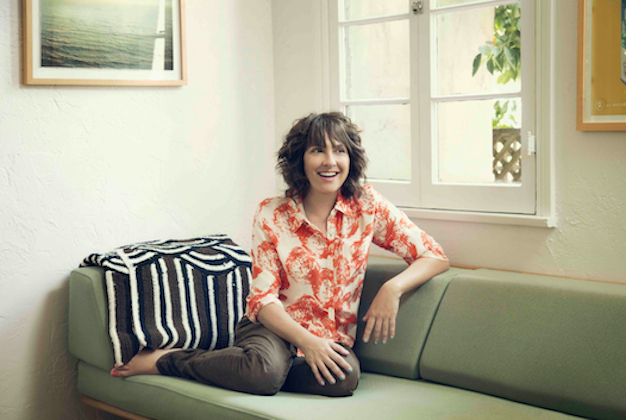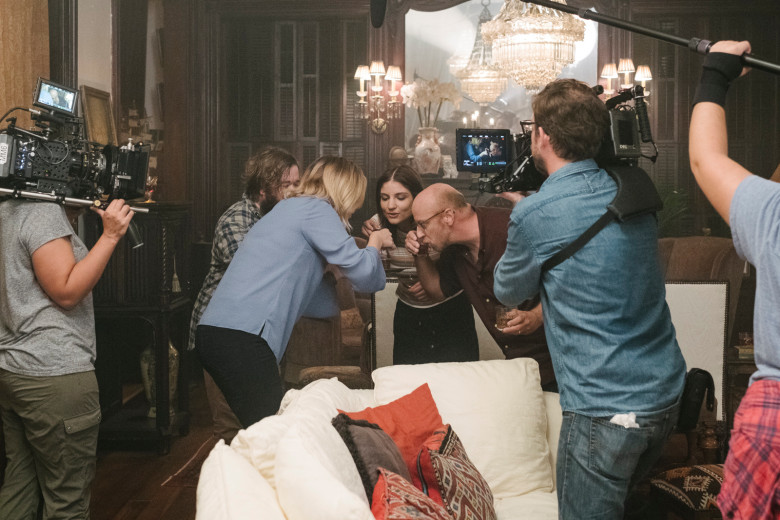JILL SOLOWAY has had an enviable career: Nominated for three Emmys as writer/executive producer of HBO’s Six Feet Under; a writer/producer on the ABC smash Grey’s Anatomy; showrunner of Showtime’s The United States of Tara; and winner of the 2013 Sundance Film Festival’s Best Director Award for her feature film debut Afternoon Delight. And now this month, Soloway returns to TV… or more precisely, to TVs, Rokus, tablets, laptops, or on whichever device you choose to conduct your binge-watching.
Soloway’s Amazon Original Series TRANSPARENT premiered its pilot in February to rave reviews, and the series kicks off (with an oh-so-bingeable 10-episode release) on September 26. Transparent revolves around a Los Angeles family and how their lives are affected by patriarch Mort (Jeffrey Tambor) coming out as transgender. The series co-stars Gaby Hoffmann, Jay Duplass, Amy Landecker, and Judith Light, with recurring appearances by Carrie Brownstein, Kathryn Hahn, Melora Hardin, and Rob Huebel.
Transparent creator Jill Soloway was kind enough to answer some questions for us about her new series, its stellar cast, and why TV seems to be a more welcoming place for women.
——
COLIN McCORMACK: You’ve had experience working in film, network TV, cable, and now at Amazon. What do you notice is the most distinct difference between these mediums?
JILL SOLOWAY: Amazon has the most amount of creative freedom that I’ve ever experienced in this business. Even including when I was making my independent film, because when you make an independent film you have to be so careful. There is a person who invested [every] dollar, you raised it on Kickstarter, and it’s dollar-to-dollar trying to make sure everybody gets paid back. Whereas it feels with Amazon that they’re in their own transformation and expansiveness and it allows them to give me the kind of budget and space that I never thought I would be able to get unless I was making international big-budget movies. To have the kind of space to really breathe and invest our craft into something so deeply, and to have it be about family and emotion, feels brand new. Even HBO, which is an amazing place, it has levels of development that make things happen slowly. Amazon just pulled the trigger and went big, and it’s been an amazing experience.
CM: Amazon releases their pilots early to get feedback from viewers, which helps them decide which shows to pick up. So during that “test drive” period, did you feel like you had more pull than you would in a traditional pilot process? You could go to Twitter, you could do a sort of lobbying or promotional tour to help get the word out and encourage people to watch the pilot and support the series.
JS: I was prepared to do some lobbying; I had activated all of the writers and the actors to get the word out. But the internet moved things so quickly that there were so many people with huge Twitter followings that said they loved it, that it was just happening. The critical masses came toward us, and it was super exciting to see that there was a mandate for the show.
CM: So where were you when you got the news that Amazon had picked it up, and how did you celebrate?
JS: I was walking on De Longpre and Western, and had just taken my kid to an open house at his new Kindergarten and I was in “mom mode” and I couldn’t even celebrate. And then a few minutes later my husband was driving and he pulled over and [said], “I want you to get out of the car and I want you to do a happy dance right now. Because you said that when you got the news you wanted to do a happy dance and you haven’t done it yet.” So I got out of the car and did a very anticlimactic, bad happy dance. You can’t really be as happy as you want to be the moment you’re supposed to be happy. I keep finding that the happy moments really come when you’re doing the work, when you’re on the set, when you’re engaged in this joyful, free-flowing creativity that we get to do. The moments that are supposed to be “happy moments” – the red carpet or the big announcements – somehow never register the way you want them to.
CM: So in terms of happy moments, I’m sure there is a filmmaker fantasy of going to Sundance, winning an award, and then every door in Hollywood is opened and you’re approached with tons of offers. So what was it like following the Afternoon Delight Sundance premiere? Were you approached with a lot of offers for more films?
JS: I’ve never been looking for those assignments or directorial offers. I think of myself more as a writer/director. It was more about, would I be able to find the kinds of investors who would allow me to keep doing the work I was doing, which is an inward-facing personal exploration of how to get performances to feel real. Whenever I am tempted by conversations that make me think about going out into the universe – “How high can I get? How much money can I get? How famous can my work be?” – I remind myself that I’m much more interested in going inside. And I feel much better when I travel inside and think about how it feels to be on a set with an actor, going to a place where the performance can feel unlike anything they’ve ever done before or anybody’s ever seen before.
CM: Your cast is so phenomenal and they feel so natural and authentic, like real family members. How did you nurture that chemistry? Is that something you can really plan for or was it just all in the casting?
JS: It was casting and very much a feeling of receptivity. I have been touting this feminine style of leadership that I like to engage in where I feel like I’m receptive much of the time. I’m not imposing, “This person must play this role and this person must say this line this way.” I sit at a welcoming, open place and particularly for the five family members it just was the right person. There was no question that Jeffrey Tambor was going to play [Mort/Maura]; there was no question that Amy Landecker was Sarah; that Gaby was Ali; Judith was the only right choice for Shelly. And I met Jay Duplass [who plays Josh] at a party and I was instantly like, “Are you an actor?” And he [said], “No, I’m a director.” [I told him], “You look exactly like the guy I’m trying to find for my show!” And fifteen minutes later, he had agreed to come in and read the next day.
CM: Was there any difference you noticed with Jay in directing a fellow filmmaker?
JS: Jay knows he can see the editing, so he’ll give me things that he’ll know I’ll need in the edit. He really enjoys the process of coming to work and being an actor– sometimes it’s so much easier to just worry about your character. And he and I have a lot in common right now. He just delivered I think somewhere between eight and ten episodes of a half-hour series, similarly-themed – not with trans people, but certainly about family in LA – to HBO. So we both are two people in the world who feel like we’re experiencing much of the same thing: writing, directing, getting it done quickly, trying to get this naturalistic style. I really relate to him in a big way – like a little brother to me. Because Jay and his brother [Mark Duplass] have always worked together, the Duplass Brothers have always been an inspiration for me and my sister [Faith Soloway]. We used to be branded as “the Soloway Sisters.” We were a writing and producing team and then she went to Boston to become a teacher, and now she’s back. She’s working on the show– she’s a writer on the show, so there’s a lot of Soloway Sisters/Duplass Brothers connectivity about what it feels like to have your best friend and sibling next to you, and how much more confidence that gives you.
CM: Speaking of siblings, the sibling bond in the show feels so real, and one thing I noticed is that the characters – especially Josh and Ali – make each other laugh. And I feel like you don’t see that often, even in comedies, where characters make each other laugh. And that just really amped up the realness between them and their bond. Were there improvised scenes or was everything scripted? How did that bonding come about?
JS: Yeah, making each other laugh is the secret sauce of the entire set and the whole family. I write things that I can’t wait to see Jeffrey, Judith, Jay, Amy, and Gaby say. Then when they’re performing they’re trying to make each other and me laugh. And then when I’m giving notes I’m going up to them and going, “What if you said this?” We’re also trying to make each other feel things. The center is about the meaning and the authenticity, as opposed to the product. There’s nobody marching around the set going, “This better be good. This better make money. This better come in under budget.” We hold the space on the set for authentic process, and it’s honestly about feeling safe and being open. And it’s my belief that that kind of process does make money. It does get attention. It does make the work good. But we are never consciously talking about money or attention or the better version of something. We’re always focused on the atmosphere of play and fun-making.
CM: I’ve heard you refer to the series as “10 episodes of a 5-hour movie.” Were the episodes filmed in chronological order outside of the pilot?
JS: We did a little bit of cross-boarding, a little bit more film-style. Sometimes we were shooting from the last episode early. For the most part we stuck to episode cross-boarding, so [episodes] two and three were shot together, and four and five, and six and seven. But there would certainly be moments from other episodes thrown in when we would get to a particular location. So all in all it did feel much more like a movie schedule when all was said and done.
CM: A couple weeks ago were the Emmys, and Julianna Marguiles mentioned in her speech what a wonderful time it was for women in TV. Winners that night also included some female writers (Moira Walley-Beckett and Sarah Silverman) and a female director (Gail Mancuso). Do you think that there are more opportunities for women in TV than in the film world?
JS: Yeah, I do. I definitely do. If you look at Steven Soderbergh‘s State of the Union about the film industry I think he gave at the [San Francisco] International Film Festival a couple years ago, the long story short was: If you’re not doing content that can be replaced with voices that can be subtitled, aka violence, fantasy, action – the kind of thing that can be appreciated by an international audience – if you’re not doing that, you have no budget to work with. You can’t expect any kind of real distribution. And I think women are drawn to stories about humans and less interested in the kinds of big action sequences and the big explosions. They really like to do the explosions of the heart and the action of emotions. So it’s still action, it’s still explosive, but it’s also about humans. And there really isn’t room for that in the film industry right now. The distinction between film and TV is getting less and less, particularly now that a lot of the people that make films are looking at their biggest distribution to happen on iTunes, and a lot of people who make TV are finding that Hulu or Amazon or Netflix is able to buy ten episodes and pay for it as if they were paying for a big-budget movie. It’s all coming together now and the fact that you can get the money spent and the distribution effort for stories that are about human beings is absolutely something that I think opens the door for more women to very easily and very naturally translate their skill sets to those kinds of stories.
LIGHTNING ROUND!
What’s the first movie you remember seeing in theaters?
Hm… I think it was Sounder.
What’s your go-to drink order at a bar?
Kettle One dirty martini. Extra dirty, extra olives, on the rocks.
Recommend a movie or TV show you love that most people haven’t heard of.
I love Fish Tank, the movie by Andrea Arnold. That was a huge influence on me. She’s the person who I’m always trying to imitate with the camera and with the emotion.
What’s an interview question you never want to hear again?
Hm… that’s a good one. (Pause) I would like to never have to answer the question again about opportunities for women, not because I’m sick of people asking it, but I would like for the world to shift so that there’s gender parities in all of these roles as director, as writer, as producer; that women can have as much access to all of this as I seem to right now.
Finally, where and when can people see Transparent?
September 26, all ten episodes on Amazon Prime. The reason I can remember it is because it’s my birthday.
The 26th is your birthday? Well that’s a good way to celebrate. Are you going to have a viewing party?
Yeah, for sure!
__
Thanks to Jill for talking to us about TRANSPARENT. To learn more, visit the show’s official website or on Facebook or Twitter.
If you’re an independent filmmaker or know of an independent film-related topic we should write about, email blogadmin@sagindie.org for consideration.




